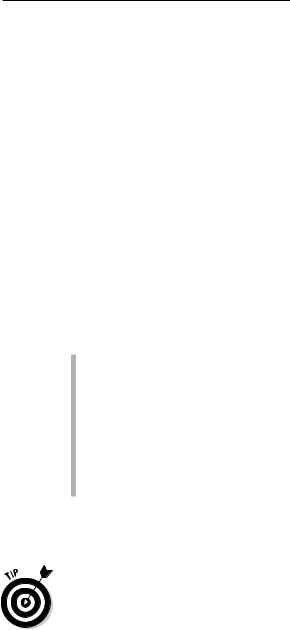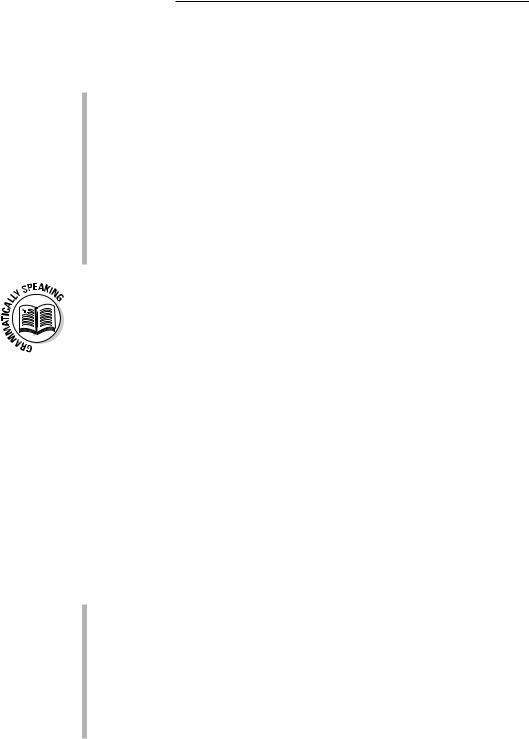
- •About the Authors
- •Dedication
- •Acknowledgments
- •Table of Contents
- •Introduction
- •About This Book
- •Conventions Used in This Book
- •Foolish Assumptions
- •How This Book Is Organized
- •Icons Used in This Book
- •Where to Go from Here
- •The French You’re Familiar With
- •Idioms and Popular Expressions
- •Key Parts of Speech
- •Cavorting with Verbs
- •Forming Sentences and Questions
- •The French Alphabet
- •Uttering Vowel and Consonant Sounds
- •Greetings: Formal and Friendly
- •Asking Questions to Get to Know People
- •Counting Your Lucky Stars: Numbers
- •Using the Calendar and Dates
- •Telling Time in French
- •Discussing Where You Live with the Verb “Habiter”
- •Discussing Daily Routine with Reflexive Verbs
- •Using Possessive Adjectives to Introduce Your Family Members
- •Basic Questions and Polite Expressions
- •Stating Your Preferences
- •Talking about Your Livelihood
- •Chatting about the Weather
- •Deciding to Keep in Touch
- •Getting Direction about Directions
- •Dining Out
- •Going to the Market
- •Going Shopping
- •Going Out with the Verb “Sortir”
- •Having Fun with the Verb “S’amuser”
- •Oh, the Places You’ll Go!
- •Making Plans with Friends
- •Making a Phone Call
- •Livin’ in the Past: Using the Past Tense
- •Playing Sports and Games
- •Going to the Beach
- •Setting Up Camp
- •Enjoying Quieter Pursuits
- •Where Do You Want to Go?
- •Getting Ready for Your Trip
- •Getting Current with Currency
- •Going to the Bank
- •Using Credit Cards and ATMs
- •Getting through the Airport
- •Navigating Buses, Trains, and Subways
- •Getting Around by Car
- •Finding Accommodations
- •Checking In to a Hotel
- •Checking Out of a Hotel
- •Getting Help Fast
- •Getting Medical Help
- •Handling Legal Matters
- •Label the Things in Your House
- •Write Your Shopping Lists in French
- •Listen to French Music
- •Watch French Movies
- •Tune in to TV5
- •Read French Publications
- •Take a Class
- •Join a French Association
- •Join an Online Chat or Pen Pal Forum
- •Using “Tu” When You Mean “Vous”
- •Using “Bonne nuit!” for Good-Bye
- •Using “Garçon” or “Porteur” to Address Service Staff
- •Saying “Je suis excité(e)” to Indicate Excitement
- •Saying “Je suis chaud(e)/froid(e)” to Say You’re Hot or Cold
- •Saying “Je suis plein/e” to Mean You’re Full
- •Using “de la glace” to Request Ice
- •Using “Je suis . . . ans” to Tell Your Age
- •Asking for Change with “J’ai besoin de change”
- •Using the Verb “Visiter” in Reference to People
- •“À mon avis”
- •“C’est pas vrai”
- •“Avec plaisir”
- •“C’est génial”
- •“À votre santé”
- •“À vos souhaits”
- •“Quelle horreur!”
- •“À bientôt”
- •“Passez-moi un coup de fil!”
- •“On y va!” or “Allons-y!”
- •“Je n’en sais rien”
- •“Je n’en reviens pas”
- •“Ça vaut la peine”
- •“C’est pas grave”
- •“N’importe”
- •“Tu cherches midi à 14h”
- •“Prenons un pot!”
- •Regular French Verbs
- •Auxiliary French Verbs
- •Track Listing
- •Customer Care
- •Index

Chapter 16: Finding a Place to Stay 267
Checking In to a Hotel
After a long trip, arriving at a hotel is probably your first highlight . . . and perhaps your first interaction with French. You may wonder how to address the hotel staff, especially when you arrive to inquire about a room. The titles Monsieur (muh-syuh) (Sir, Mister [Mr.]), Madame (mah-dahm) (Ma’am, Misses [Mrs.]), and Mademoiselle (mahd-mwah-zehl) (Miss) are used in French much more than in English and do not sound as formal. In fact, it is polite to add them after bonjour (bohN-zhoohr) (hello, good morning), especially when addressing someone you don’t know.
Using direct object pronouns
In a conversation, you wouldn’t sound very natural if you kept repeating the same words: “I would like a room. Can I see the room? Let’s go and see the room.” Instead, you’d say, “I would like a room. Can I see it? Let’s go and see it,” which sounds a lot better. So drop the direct object and replace it with one of the following direct object pronouns:
me (muh) (me)
te (tuh) (you [singular informal])
le (luh) (him, it)
la (lah) (her, it)
nous (nooh) (us)
vous (vooh) (you [singular formal or plural])
les (ley) (them)
Just remember that the pronoun you choose depends on whether the noun it replaces is feminine or masculine, singular or plural. The placement of the pronoun is also important. You must put the direct object pronoun in front of the conjugated verb.
The object pronouns me, te, nous, and vous are easy to remember because each has only one form for both masculine and feminine. For example,
Est-ce que tu me vois? (ehs-kuh tew muh vwah?) (Do you see me?)
Oui, je te vois. (wee, zhuh tuh vwah.) (Yes, I see you.)
Est-ce qu’il nous appelle? (ehs-keel nooh-zah-pehl?) (Is he calling us?)
Oui, il vous appelle. (wee, eel vooh-zah-pehl.) (Yes, he is calling you.)
www.ATIBOOK.ir

268 Part III: French on the Go
Things are a little trickier with the direct object pronouns in the third person, le, la, and les. The French forms of these pronouns change based on the gender and number of the noun they replace. Follow these rules:
Use le when the noun being replaced is masculine singular. For example, the sentence Il voit l’hôtel (eel vwah loh -tehl) (He sees the hotel) changes to Il le voit (eel luh vwah) (He sees it).
Use la when the noun being replaced is feminine singular. For example, the sentence Nous suivons la réceptionniste (nooh swee-vohN lah rey- sehp-syohN-neest) (We are following the receptionist) becomes Nous la suivons (nooh lah swee-vohN) (We are following her).
In the third person plural, there is only one pronoun that replaces both a masculine and a feminine plural noun: les. For example, the sentence Elle vérifie les dates (ehl vey-ree-fee ley daht) (She is checking the dates) becomes Elle les vérifie (ehl ley vey-ree-fee) (She’s checking them).
Naturally, there is an exception to the rule that the direct object pronoun must appear in front of the conjugated verb: When you have a helping verb plus an infinitive in your sentence, you need to put the object pronoun in front of the infinitive form, as in the following examples:
Il veut voir la chambre. (eel vuh vwahr lah shahN-bruh.) (He wants to see the room.) — direct object
Il veut la voir. (eel vuh lah vwahr.) (He wants to see it.) — direct object pronoun
Je dois vérifier les prix. (zhuh dwah vey-ree-fyey ley pree.) (I must check out the prices.) — direct object
Je dois les vérifier. (zhuh dwah ley vey-ree-fyey.) (I must check them out.) — direct object pronoun
Filling out a registration form
When you arrive at a hotel, chances are, you have to fill out une fiche (ewn feesh) (a registration form). This form may ask you for these items:
nom/prénom (nohN/prey-nohN) ([last] name/first name)
lieu de résidence/adresse (lyuh duh rey-zee-dahNs/ahd-rehs) (address)
rue/numéro (rew/new-mey-roh) (street/number)
ville/code postal (veel/kohhd poh-stahl) (city/zip code)
état/pays (ey-tah/pey-ee) (state/country)
numéro de téléphone (new-mey-roh duh tey-ley-fohhn) (telephone number)
www.ATIBOOK.ir

Chapter 16: Finding a Place to Stay 269
nationalité (nah-syoh-nah-lee-tey) (nationality)
date/lieu de naissance (daht/lyuh duh neh-sahNs) (date/place of birth)
numéro de passeport (new-mey-roh duh pahs-pohr) (passport number)
signature (see-nyah-tewr) (signature)
numéro d’immatriculation de la voiture (new-mey-roh dee-mah-tree- kew-lah-syohN duh lah vwah-tewr) (license plate number)
date de l’arrivée (daht duh lah-ree-vey) (date of arrival)
date du départ (daht dew dey-pahr) (date of departure)
Should you tip hotel staff such as bellboys and maids? A service charge is generally included in hotel and restaurant bills. However, if the service has been particularly good, you may want to leave an extra tip.
Talkin’ the Talk
Carol is checking in at the reception desk while Max brings in the luggage with the doorman’s help.
Carol: Nous prenons la belle chambre au troisième étage. nooh pruh-nohN lah behl shahN-bruh oh trwah- zee-ehm ey-tahzh.
We’ll take the beautiful room on the fourth floor.
Le |
Bon. Veuillez remplir cette fiche, s’il vous plaît, et |
réceptionniste: |
j’ai besoin de vos passeports. |
|
bohN. vuh-yey rahN-pleer seht feesh, seel vooh |
|
pleh, ey zhey buh-zwaN duh voh pahs-pohr. |
|
Good. Would you please fill out this form, and I |
|
need your passports. |
Carol: |
Les voilà . . . |
et la fiche . . . . |
C’est fait. |
||
|
ley vwah-lah |
. . . |
ey lah feesh . . . . |
seh feh. |
|
|
Here they are . . |
. and the (registration) form…. |
|||
|
It’s done. |
|
|
|
|
Le |
Merci, madame. L’ascenseur est à gauche. Je vous |
réceptionniste: |
souhaite une bonne soirée. |
|
mehr-see, mah-dahm. lah-sahN-suhr eh-tah gohsh. |
|
zhuh vooh sweht ewn bohhn swah-rey. |
|
Thank you, ma’am. The elevator is on the left. I |
|
wish you a nice evening. |
www.ATIBOOK.ir

270 Part III: French on the Go
Carol: Merci. À quelle heure fermez-vous la porte principale?
mehr-see. ah kehl uhr fehr-mey-vooh lah pohrt praN-see-pahl?
Thank you. What time do you close the main door?
Le |
À minuit, mais vous pouvez toujours sonner. |
réceptionniste: |
ah mee-nwee, meh vooh pooh-vey tooh-zhoohr |
|
sohh-ney. |
|
At midnight, but you can always ring. |
|
|
Words to Know
veuillez remplir |
vuh-yey rahN-pleer |
would you please |
|
|
fill out |
|
|
|
j’ai besoin de |
zhey buh-zwaN duh |
I need |
|
|
|
l’ ascenseur |
lah-sahN-suhr |
the elevator |
|
|
|
je vous souhaite |
zhuh vooh sweht |
I wish you |
|
|
|
vous fermez |
vooh fehr-mey |
you close |
|
|
|
la porte principale |
lah pohrt |
main door |
|
praN-see-pahl |
|
|
|
|
vous pouvez sonner |
vooh pooh-vey |
you can ring |
|
sohh-ney |
|
|
|
|
Asking for towels and other essentials
Okay, you’re settling in to your hotel room, but you discover you need more towels, blankets, and pillows. Or maybe you discover that the light bulb
is out, or there’s no more toilet paper. If you need any of these items, you
www.ATIBOOK.ir
